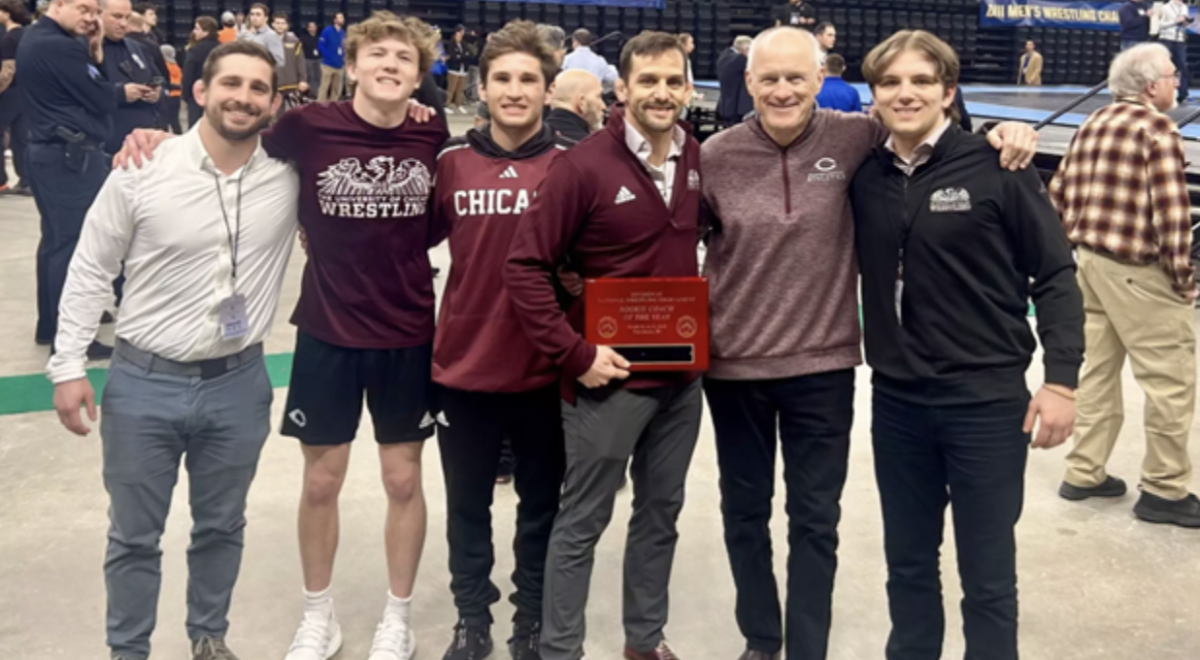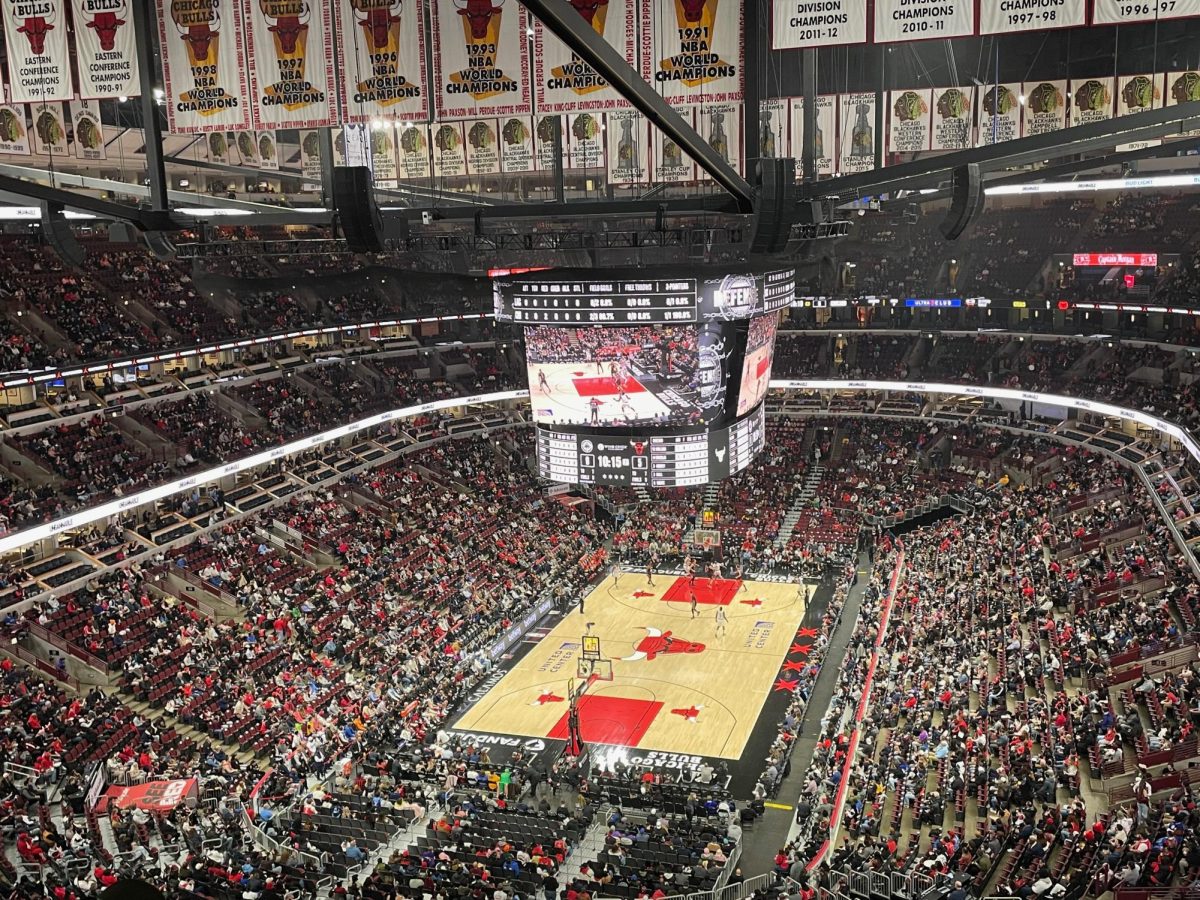[img id=”77837″ align=”alignleft”]
Chicago Maroon: How is the season going so far?
Dick Maloney: Well, obviously we’d like to be 3–0, there’s no question. Our first game was a very emotional win. We won in overtime. We were ahead by 18 points at one point; Kenyon caught up, they went ahead with 26 seconds left, kicked the ball off, and we ended up kicking a field goal in overtime, so it was quite a great win on the road. We played Wabash, who is ranked in the top 10 in the country, and at one point we were up 14-10. Then they had a 21-point swing two minutes before halftime, which we never came back from. Elmhurst, a really good football team, currently undefeated as well, is in the top 25. So we’ve played some good competition, but we need obviously to play more consistently. The one thing I think we’ve done a good job with is the turnover game. We’re actually plus in turnovers, which is encouraging. The Elmhurst game was discouraging in the fact that we had a number of penalties, not of the nature of holding or personal fouls, but functional penalties like offsides.
CM: What do you think the team’s strengths are this year?
DM: I really think our strengths lie in the players’ attitude, their commitment, their togetherness, their camaraderie. This is one of the finest emotional teams and one of the finest atmosphere teams that I’ve been around, which is very encouraging. Everything that we’ve asked this team to do, they have done with great vigor and pride and enthusiasm. We do have talent, but we just really have to be consistent.
CM: What do you want to work on?
DM: We need to stay on schedule in other words, first and 10, we need to make it second and three, not second down and 12. Same thing for third down. You always want to have situations that are manageable. On defense, it’s just the opposite; you want to have second and 10, and third and eight. Defensively, as I mentioned, third down has been kind of a bugaboo for us, so to speak, and the kicking game was not good for us against Elmhurst.
CM: How are you feeling going into the game against Oberlin?
DM: We feel very good. There are some areas where we play very well at times. I think offensively, we’ve had some real bright spots, in the sense that we’ve thrown the ball very well. Marshall Oium has done a nice job as quarterback. Clay Wolff is an outstanding receiver. Dee Brizzolara, a freshman, has done an outstanding job; I think he’s third in the country in total yards. He’s also a kick returner. He has tremendous speed; he’s been a help there. We have a group of seniors, Mike Berman, Joe Stoner, Jay McGovern, and Mike Emerson who have all done a good job. Losing Tommy Parks, who was our number one running back, was certainly discouraging. Francis Adarkwa and Mike Wuest, who is a freshman, will have to step up. Francis was rookie of the year last year in the league. And Michael is a very good player as well. On offense, we’ve thrown the ball rather well. Defensively, we’ve done a good job. We really have to take away the big play. Wabash hurt us with big plays, as I mentioned earlier. Elmhurst is the same thing, plays of over 50 yards.
CM: Are there any significant changes from last year?
DM: Our defensive coaching staff has totally changed. Two of our coaches went to other jobs, so we’ve changed our defensive perspective a little bit there. Each year, what you do here at the University of Chicago and other D-III schools, you don’t have the luxury of recruiting for the type of defense or offense that you want to run. What you try to do is find great fits for the university, young men who can do the job in the classroom and have the burning desire to compete at one of the greatest institutions, and also love and want to excel at the game of football. You find that, you bring them in, you develop them, [and] then you have to refine your offensive and defensive strategy around their strengths each year.
CM: How many seniors are on the team? Do players leave the program?
DM: We have 65 currently on the roster, and a lot of the teams we play have double that. Some are even around 150. I don’t think we need to be at that level, but certainly having a good squad size is important from a depth perspective, as well as for practice. See, most teams at practice will have a scout or imitation squad for offense and defense, so they will be able to get in a large number of repetitions. What we have to do is scout each other; so where Case might be getting 48 repetitions at practice because they have two separate teams, we’re getting 28 because we have to do each team together. That’s something we’re looking to do in the future; keep the recruits at about 30, bring in some outstanding student athletes, and build the squad size and build the talent and depth.
If you look at college football, most teams, even scholarship teams, will lose around 30 to 60 percent. Some schools for example are bringing in 60 to 70 freshmen, and they have 20 of those when they’re seniors. You run into the injury factors, as well as running into people that have other interests, people that are double or triple majoring. And then you have a certain group that comes in and says, playing college football is a lot of hard work, a lot of time, and maybe there are other things I want to do as well. Percentage-wise, we’re generally in that 60-percent retention rate, which would put us in the top fifth of what most schools would be.
— Alex Sisto








